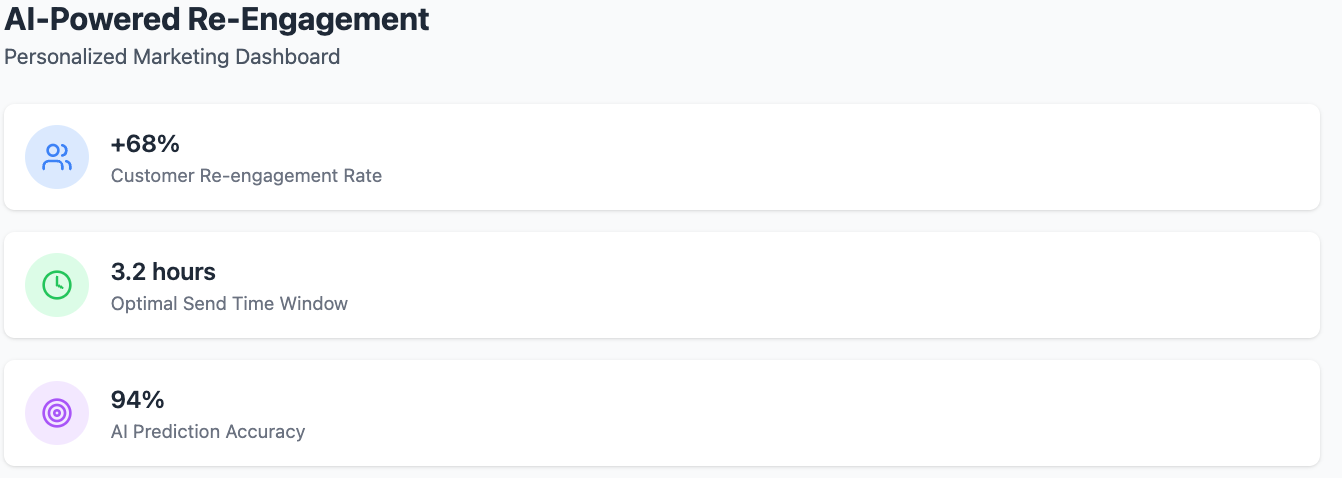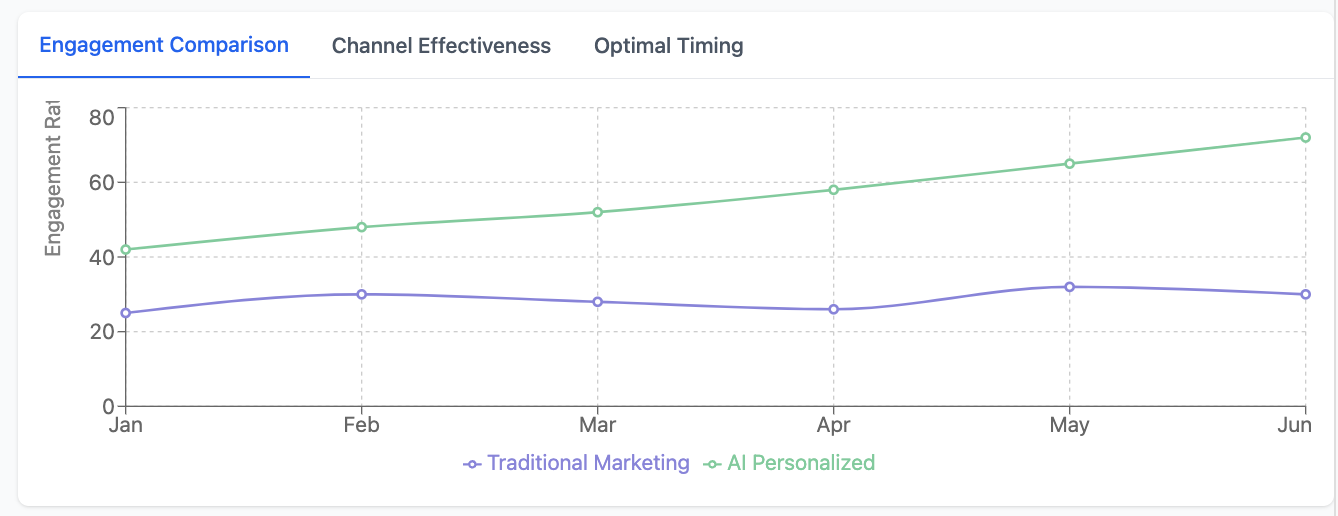Re Engage Your Audience with Personalized AI Marketing Strategies
Re-Engage Your Audience With Personalized AI Marketing: How It’s Transforming Re-engagement Strategies
In the increasingly crowded digital landscape, maintaining audience engagement has become one of the greatest challenges for marketers. Customers are overwhelmed with content and promotions, making it difficult for brands to recapture attention once it’s lost. Artificial intelligence is changing this dynamic, offering unprecedented capabilities to reconnect with dormant audiences through highly personalized, timely, and relevant interactions. Let’s explore how AI-powered personalization is revolutionizing audience re-engagement strategies.

Introduction to AI-Powered Personalization
In the fast-paced world of digital marketing, standing out from the crowd is more challenging than ever. Customers are bombarded with countless messages daily, making it crucial for brands to deliver experiences that resonate on a personal level. This is where AI-powered personalization comes into play. By leveraging artificial intelligence, businesses can create highly tailored interactions that capture attention and foster deeper connections with their audience. Let’s dive into what AI-powered personalization is and why it’s a game-changer for modern marketing strategies.
Definition and Importance of AI-Powered Personalization
AI-powered personalization involves using artificial intelligence to craft individualized experiences for customers across various touchpoints. This sophisticated approach goes beyond traditional methods by analyzing vast amounts of customer data, including behavior and preferences, to deliver marketing strategies that cater to each person’s unique needs. In today’s digital marketing landscape, AI-powered personalization is indispensable. It enables businesses to build stronger customer relationships, enhance customer satisfaction, and ultimately drive revenue growth. By understanding and anticipating customer preferences, brands can create more meaningful and engaging interactions that stand out in a crowded marketplace.
Brief History of AI-Powered Personalization
The journey of personalization in marketing has evolved significantly over the years. In the early 2000s, businesses began experimenting with basic personalization techniques, such as recommending products based on past purchases. These early efforts laid the groundwork for more advanced methods. However, it wasn’t until the advent of big data and machine learning algorithms that AI-powered personalization truly took off. These technologies enabled marketers to analyze complex data sets and uncover insights that were previously unattainable. Today, AI-powered personalization is a cornerstone of many marketing strategies, allowing brands to deliver highly relevant and timely content to their audiences.

Current State of AI-Powered Personalization in Digital Marketing
AI-powered personalization is now a critical component of digital marketing, influencing everything from email campaigns to social media strategies and search engine optimization (SEO). Businesses are harnessing AI tools to analyze customer data, predict behavior, and deliver personalized ads that resonate with their target audiences. For instance, Google Ads utilizes AI-powered predictive analytics to serve personalized ads based on users’ search history and online behavior. Similarly, platforms like Facebook and Instagram employ AI algorithms to curate content that aligns with users’ interests and preferences.
The benefits of AI-powered personalization are manifold. It leads to increased customer engagement, improved satisfaction, and significant revenue growth. A study by Salesforce revealed that businesses leveraging AI-powered personalization experience an average revenue increase of 15%. Moreover, AI tools help automate repetitive tasks, allowing marketers to focus on strategic and creative initiatives.
However, the rise of AI-powered personalization also brings challenges. Data privacy concerns, the need for high-quality data, and the risk of over-reliance on automation are critical issues that businesses must navigate. Ensuring responsible and transparent use of AI is paramount to maintaining customer trust and data privacy.
In conclusion, AI-powered personalization is revolutionizing digital marketing strategies. Its ability to deliver tailored experiences, boost customer engagement, and drive revenue growth makes it an essential tool for businesses aiming to stay competitive. As AI technology continues to evolve, its role in personalization will only become more significant, offering new opportunities for brands to connect with their audiences in meaningful ways.

The Evolution of Personalization Through AI
Traditional personalization often relied on basic segmentation and simple variables like first name insertion. Today’s AI-driven personalization represents a quantum leap forward—analyzing thousands of data points to create truly individualized experiences at scale. This evolution now includes sophisticated customer segmentation, allowing AI to efficiently group customers with similar traits for targeted advertising. This enables marketers to re-engage audiences with precision and relevance that was previously impossible.
Hyper-Personalized Messaging: Beyond “Hello [First Name]”
AI has transformed what’s possible in personalized communication by enabling contextually relevant messaging based on a comprehensive understanding of each customer:
Past Customer Behavior Integration
Modern AI systems can analyze a customer’s entire history with your brand to better understand the target audience, incorporating:
-
Products previously purchased or viewed
-
Content consumed and engagement patterns
-
Service interactions and feedback provided
This historical context allows re-engagement messages to reference specific experiences meaningful to each individual, creating immediate recognition and relevance.
Dynamic Content Customization
Rather than sending static messages, AI enables dynamic content that adapts based on individual user attributes:
-
Personalized product recommendations that reflect actual preferences
-
Custom imagery and design elements aligned with demonstrated interests using generative AI
-
Tailored offers based on previous purchase behavior and price sensitivity
For example, an e-commerce retailer might send an abandoned cart email featuring not only the forgotten items but also newly released products specifically selected to match that customer’s style preferences.
Behavioral Trigger Optimization
AI excels at identifying the precise moments when re-engagement is most likely to succeed:
-
Account inactivity patterns that signal optimal timing for outreach
-
Life event detection that suggests opportunities for relevant reconnection
-
Engagement threshold analysis that reveals when a customer is at risk of churning
These behavioral triggers ensure re-engagement attempts occur at moments of maximum receptivity, dramatically improving response rates.
Generative AI-Driven Content Generation: Personalization at Scale
Creating truly personalized content for thousands or millions of customers would be impossible through manual efforts. AI-driven content generation helps in automating repetitive tasks, making personalization scalable:
Tailored Product Recommendations
AI recommendation engines analyze vast arrays of data points to suggest products with remarkable accuracy:
-
Purchase history analysis that identifies complementary products
-
Behavioral pattern recognition that predicts future needs
-
Collaborative filtering that leverages insights from similar customers
These sophisticated recommendations make re-engagement communications immediately valuable to recipients, providing a compelling reason to return.
Personalized Email Optimization
AI transforms every element of email communications for maximum impact:
-
Subject line generation tailored to individual open history and preferences
-
Content customization based on demonstrated interests and engagement patterns
-
Call-to-action optimization based on previous response behaviors
These personalized elements significantly improve open rates, click-through rates, and ultimately, conversion rates for re-engagement campaigns.
Custom Video and Visual Content
Perhaps most impressively, AI now enables the creation of personalized visual content:
-
Highlight reels assembled from content most relevant to each viewer
-
Custom video messages incorporating personal data points
-
Dynamic visual elements that adapt to individual preferences
This level of visual personalization creates a powerful emotional connection that static content simply cannot match.
Intelligent Timing and Channel Selection: Reaching Customers at the Right Moment
Even perfect content will fail if delivered at the wrong time or through the wrong channel. AI excels at optimizing the delivery of targeted ads at the right time and through the right channel:
Individual Send-Time Optimization
AI algorithms can determine with remarkable precision when each individual customer is most likely to engage:
-
Analysis of historical engagement patterns to identify optimal times
-
Consideration of time zone, device usage, and daily routines
-
Continuous learning from response patterns to refine timing
This individual-level timing optimization ensures re-engagement messages arrive when customers are most receptive.
Channel Preference Prediction
Different customers prefer different communication channels, and AI can identify these preferences:
-
Email engagement history to determine email receptiveness
-
SMS response patterns to gauge text message openness
-
App usage analysis to assess push notification effectiveness
By matching the re-engagement channel to individual preferences, brands can significantly improve response rates.
Frequency Management and Fatigue Prevention
AI systems can carefully monitor engagement signals to prevent message fatigue:
-
Dynamic frequency caps based on individual tolerance levels
-
Channel rotation strategies to avoid overwhelming any single channel
-
Engagement response monitoring to adjust frequency in real-time
This intelligent approach to frequency management prevents the alienation that often results from excessive re-engagement attempts.
Predictive Analytics and Segmentation: Anticipating Needs Before They Arise
Perhaps the most powerful aspect of AI-powered re-engagement is its predictive capability—anticipating customer behavior before it occurs, thereby enhancing marketing efforts by using predictive analytics and segmentation to anticipate customer needs:
Churn Prediction and Prevention
Advanced AI models can identify customers at risk of churning with remarkable accuracy:
-
Engagement pattern analysis to detect early warning signs
-
Comparison with historical churn indicators from similar customers
-
Behavioral signals that indicate declining interest or satisfaction
These predictive capabilities enable proactive re-engagement before a customer fully disengages, dramatically improving retention rates.
Lifetime Value Prediction
AI can forecast the potential long-term value of re-engaged customers:
-
Purchase pattern analysis to predict future spending
-
Engagement behavior modeling to estimate relationship longevity
-
Category interest tracking to anticipate expansion opportunities
This predicted lifetime value allows marketers to allocate re-engagement resources appropriately, focusing efforts on high-potential customers.
Event and Behavior Anticipation
AI systems can predict upcoming needs based on historical patterns:
-
Seasonal purchase behavior forecasting
-
Life event prediction based on behavioral signals
-
Replenishment timing estimation for consumable products
By anticipating these future needs, re-engagement messages can arrive precisely when they become relevant to the customer.
AI-Enhanced Customer Experience: Redefining Engagement
Beyond direct marketing communications, AI is transforming the overall customer experience in ways that naturally foster re-engagement:
Intelligent Conversational Interfaces
AI-powered chatbots and virtual assistants create always-available engagement opportunities:
-
24/7 availability for customer questions and needs
-
Personalized responses based on customer history
-
Seamless escalation to human support when appropriate
These intelligent interfaces provide immediate value to returning customers, encouraging continued engagement.
Real-Time Sentiment Analysis
AI can monitor and respond to customer sentiment across touchpoints:
-
Social media sentiment tracking to identify engagement opportunities
-
Review and feedback analysis to address concerns proactively
-
Interaction tone analysis to adapt communication style accordingly
This emotional intelligence enables more authentic and effective re-engagement approaches.
Enhanced Event and Community Experiences
For brands that host events or manage communities, AI offers powerful re-engagement tools:
-
Intelligent matchmaking for networking opportunities
-
Personalized agenda recommendations based on interests
-
Custom content delivery during and after events
These enhanced experiences provide compelling reasons for disengaged audience members to reconnect.
Implementation Considerations: Balancing Technology and Trust
While AI offers powerful re-engagement capabilities, successful implementation requires a cohesive marketing strategy that balances technology and trust, along with careful consideration of several factors:
Privacy and Compliance
Effective AI personalization requires data, but this must be balanced with privacy concerns:
-
Clear consent mechanisms for data collection and use
-
Transparent opt-out options for personalization features
-
Compliance with regulations like GDPR, CCPA, and emerging privacy laws
By prioritizing privacy, brands build the trust necessary for successful re-engagement.
Authentic Communication
Even with advanced AI, communications must maintain an authentic human connection:
-
Balance algorithmic precision with brand voice and values
-
Avoid uncanny valley experiences that feel excessively mechanical
-
Maintain transparency about AI involvement in personalization
This authenticity ensures that re-engagement attempts resonate emotionally, not just technologically.
Continuous Optimization
AI re-engagement strategies require ongoing refinement:
-
A/B testing of personalization approaches to identify optimal strategies
-
Regular review of engagement metrics to assess effectiveness
-
Continuous model training with new data to improve predictions
This commitment to optimization ensures that re-engagement strategies evolve alongside changing customer preferences.
Conclusion: The Future of AI-Powered Re-engagement
As AI technology continues to advance, we can expect even more sophisticated re-engagement capabilities. From increasingly accurate predictive models to emotionally intelligent communication, these developments will further enhance brands’ ability to reconnect with dormant audiences.
For marketers looking to revitalize their audience relationships, AI-powered personalization offers an unprecedented opportunity to transform re-engagement from generic blasts to meaningful individual conversations. The brands that master this approach won’t just re-engage their audiences—they’ll redefine what audience relationships can become in the age of artificial intelligence.
This article explores how artificial intelligence is revolutionizing audience re-engagement through hyper-personalized messaging, AI-driven content generation, intelligent timing and channel selection, predictive analytics, and enhanced customer experiences—enabling marketers to create more meaningful connections with their audiences.
